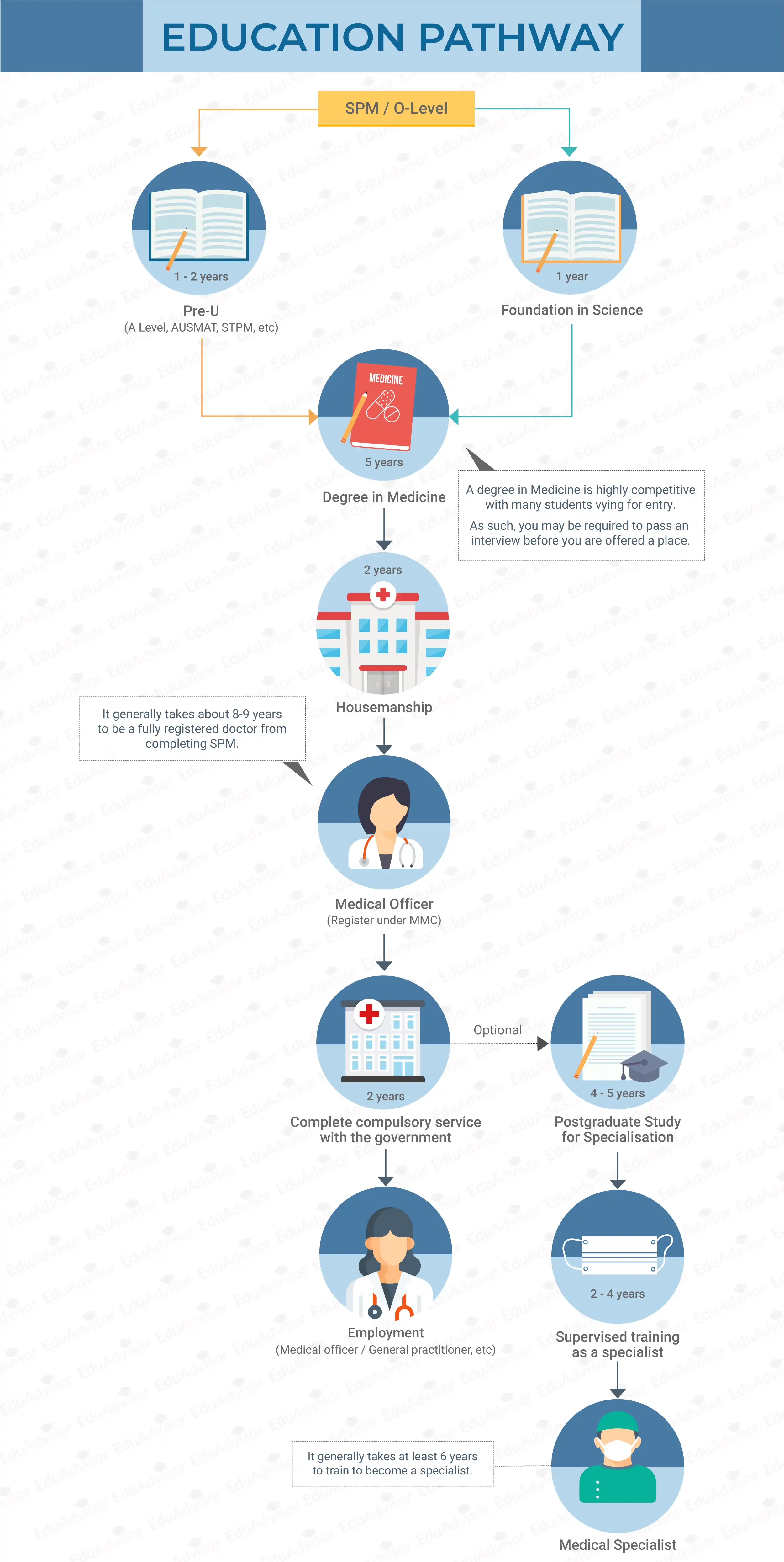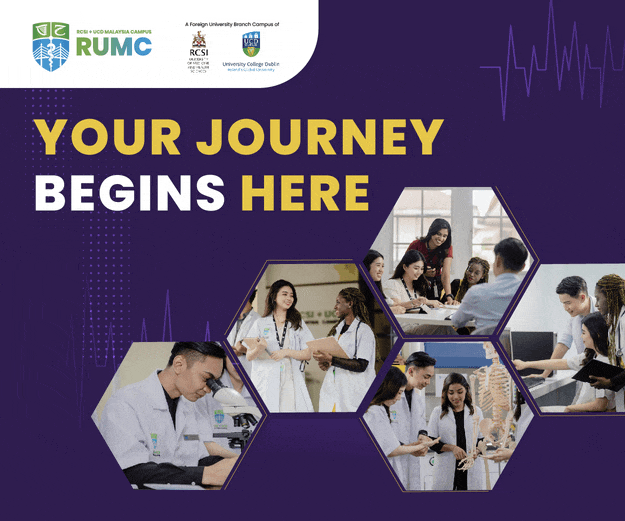The Complete Guide to Studying Medicine in Malaysia
Find the best medical schools to study medicine in Malaysia. Check out this course guide to see pathway, requirements, and compare institutions and fees.

If you've always wanted to study MBBS (Medical Degree) in Malaysia, our guide will show you everything you need to know.
From revealing the best medical universities in Malaysia to letting you know the detailed steps on how to be a doctor in Malaysia, this guide has got you covered.
Read on for more insights on studying a Medical Degree and becoming a doctor!

RCSI & UCD Malaysia Campus (RUMC)
Bachelor of Medicine, Bachelor of Surgery and Bachelor of Obstetrics (MB BCh BAO)
✓Guaranteed spot to study in Ireland, either in RCSI or UCD, for the first 2.5 years of your medical degree programme, enabling you to immerse in the rich academic traditions and learn from renowned professors and researchers at the forefront of medical innovation
#1. What Is Medicine?
 Medicine relates to diagnosing, treating and preventing a sickness, disease or injury. It involves utilising healthcare practices to maintain and restore the health and wellbeing of a person.
Medicine relates to diagnosing, treating and preventing a sickness, disease or injury. It involves utilising healthcare practices to maintain and restore the health and wellbeing of a person.
From treating the common cold to performing complex surgeries, doctors play a significant role in keeping today’s society well and healthy. When you are sick or unwell, a doctor performs an examination to find out the cause of your illness (also known as a “diagnosis”). The doctor then suggests suitable treatments for you and prescribes the right medication to help you recover.
As part of your Medical Degree, you will gain extensive knowledge in medical sciences and the right clinical skills to provide effective patient care. This includes being able to accurately diagnose and treat patients, explain treatments to patients and collaborate with other healthcare professionals.

Medical Fields and Specialties
 Medicine as a whole is broad and multidisciplinary. There are many departments within medicine and you will require years of training and experience before you are able to specialise in a particular field.
Medicine as a whole is broad and multidisciplinary. There are many departments within medicine and you will require years of training and experience before you are able to specialise in a particular field.
Here are some of the specialties within medicine in major hospitals.
| Field | What Is It All About |
|---|---|
| Anaesthesiology | Relates to providing pain relief to patients prior to, during and after surgery |
| Internal Medicine | Relates to the diagnosis and treatment of illnesses, including cancer, infections and diseases affecting the heart, blood and kidneys, among others |
| Emergency Medicine | Involves providing immediate medical attention to patients with an acute illness or serious injuries to prevent death or disability |
| Obstetrics & Gynaecology | Relates to medical care for women, particularly care during childbirth, and diseases of the female reproductive system |
| Orthopaedics | Focuses on injuries and diseases of the body's musculoskeletal system, including bones, joints, ligaments, tendons, muscles and nerves |
| Paediatrics | Deals with medical care of infants and children |
| Surgery | Deals with injuries and disorders that require surgical intervention |
As part of your clinical training during your Medical Degree and your 2-year housemanship, you will be exposed to many of these major departments. This allows you to gain a good understanding of them before deciding on your medical specialty.
For more medical specialisations, you can check out the National Specialist Register.

RCSI & UCD Malaysia Campus (RUMC)
Foundation in Science
✓Rigorous curriculum that provides you with the essential knowledge and skills needed to succeed in medical school
#2. Entry Requirements to Study Medicine
a) What subjects are needed to study medicine?
To study a Medical Degree, you must have studied these subjects for SPM or equivalent, based on the Malaysian Medical Council’s (MMC) requirements for medicine:
- Biology
- Chemistry
- Physics
- Mathematics or Additional Mathematics
As for A-Level, STPM or equivalent, the required subjects are:
- Biology
- Chemistry
- Physics or Mathematics
In addition to that, you must also have a level of competency in English to be able to successfully complete a Degree in Medicine.
b) What are the requirements to study medicine?
These are the general entry requirements to pursue a Degree in Medicine:
- A-Level: BBB, ABC or AAC in Biology, Chemistry, and Physics or Mathematics
- STPM: BBB, ABC or AAC in Biology, Chemistry, and Physics or Mathematics or CGPA 3.0 in 3 subjects that are Biology, Chemistry, and Physics or Mathematics.
- Foundation in Science or Matrikulasi: Minimum CGPA of 3.00 in Biology, Chemistry and Physics or Mathematics; and 5Bs in SPM including Biology, Chemistry, Physics and Mathematics or Additional Mathematics
- UEC: B4 in 5 subjects including Biology, Chemistry, Physics, Mathematics and Advanced Mathematics
#3. Studying a Medicine Course
 a) What subjects will you study for a Medical Degree?
a) What subjects will you study for a Medical Degree?
Most Medical Degrees are split into 2 phases — Phase 1 and Phase 2.
Phase 1 (the first 2 years of your degree) focuses on pre-clinical training in an academic setting where you’ll learn the theoretical basics of medical science. Some of the subjects you’ll study are:
- Anatomy
- Biochemistry
- Microbiology
- Pharmacology
- Pathology
- Clinical Medicine
Phase 2, which consists of the remaining years of your degree, focuses on clinical training where you will undertake clinical rotations at hospitals and health clinics. You will gain hands-on experience with patients and get the chance to try out various clinical disciplines such as general medicine, surgery, paediatrics and internal medicine.

b) How long is an MBBS Degree?
A Medical Degree is 5 years long in Malaysia.
c) How much does it cost to study medicine in Malaysia?
The total estimated fees to pursue a Medicine Degree in Malaysia for 5 years can range from RM260,000 to RM650,000.
#4. How to Become a Doctor in Malaysia
 This is the general pathway to becoming a doctor in Malaysia.
This is the general pathway to becoming a doctor in Malaysia.
- Step 1: Complete a pre-medical course (e.g. A-Level, STPM, Foundation in Science) after SPM.
- Step 2: Enrol in a MBBS Degree that's typically 5 years long.
- Step 3: Undergo 2 years of housemanship, which is a compulsory internship for all aspiring doctors.
- Step 4: Once you've completed your housemanship, you can apply for full registration as a medical officer with MMC.
- Step 5: You will need to continue 2 years of compulsory service with the government.
- Step 6: If you want to be a specialist (e.g. anaesthesiologist, gynaecologist, paediatrician), you will need to pursue postgraduate studies, which take about 4-5 years. You'll also need to undergo 2-4 years of supervised training as a specialist.
- Step 7: Finally, once you’ve met the criteria to be a specialist, you can register yourself with MMC as a specialist.
To summarise, it generally takes a total of 8-9 years to become a fully registered doctor after completing SPM, and more than 10 years to become a specialist.
PRO TIP
Make sure your Medical Degree is recognised by the Malaysian Medical Council. Otherwise, you may risk not being able to practise medicine in Malaysia.
#5. Should You Study Medicine?
 a) Is medicine the right course for you?
a) Is medicine the right course for you?
If you find yourself pursuing medicine for the money, prestige or due to pressure from your parents, we highly encourage you to consider your decision carefully. This is because medical school can be demanding, time consuming and expensive.
Here are some questions to ponder before deciding to be a doctor:
- Do you consider yourself analytical and investigative?
- Do you enjoy conducting science experiments?
- Do your friends say you're a good listener?
- Do you have excellent grades in science and maths?
- Can you endure long hours and working night shifts?
- Are you prepared for a lifetime of study?

RCSI & UCD Malaysia Campus (RUMC)
Bachelor of Medicine, Bachelor of Surgery and Bachelor of Obstetrics (MB BCh BAO)
✓Guaranteed spot to study in Ireland, either in RCSI or UCD, for the first 2.5 years of your medical degree programme, enabling you to immerse in the rich academic traditions and learn from renowned professors and researchers at the forefront of medical innovation
b) Skills required to be a doctor
Here are some key skills a good doctor should have:
- Compassion and a genuine concern for others
- Tenacity and determination
- Ability to think critically and solve problems
- Ability to work under pressure
- Strong listening and communication skills when dealing with patients
- Good judgement and strong decision-making skills
#6. Job Options with a Medical Degree
Upon graduating with a Medical Degree, most medical graduates will go on to fulfil the requirements to become a medical doctor.
If you would like to be a medical specialist, you will need to pursue the relevant postgraduate qualifications. Here are some medical specialist careers:
- Paediatrician
- Psychiatrist
- Dermatologist
- Orthopaedic Surgeon
- Ophthalmologist
- Radiologist
- Vascular Surgeon
If you prefer alternative career options in non-clinical fields, you can consider the following jobs:
- Hospital Administrator
- Medical Researcher
- Medical Journalist
- Lecturer
- International Aid Worker
#7. Best Medical Universities in Malaysia
If medicine is right up your alley, then check out some of these Malaysian Medical Council recognised universities below. You can also use our university comparison tool to compare other medical schools in Malaysia.
RCSI & UCD Malaysia Campus (RUMC)
George Town, Pulau Pinang
Bachelor of Medicine, Bachelor of Surgery and Bachelor of Obstetrics (MB BCh BAO)
Intake
Sep
Tuition Fees
RM620,000
 a) What subjects will you study for a Medical Degree?
a) What subjects will you study for a Medical Degree? a) Is medicine the right course for you?
a) Is medicine the right course for you?








